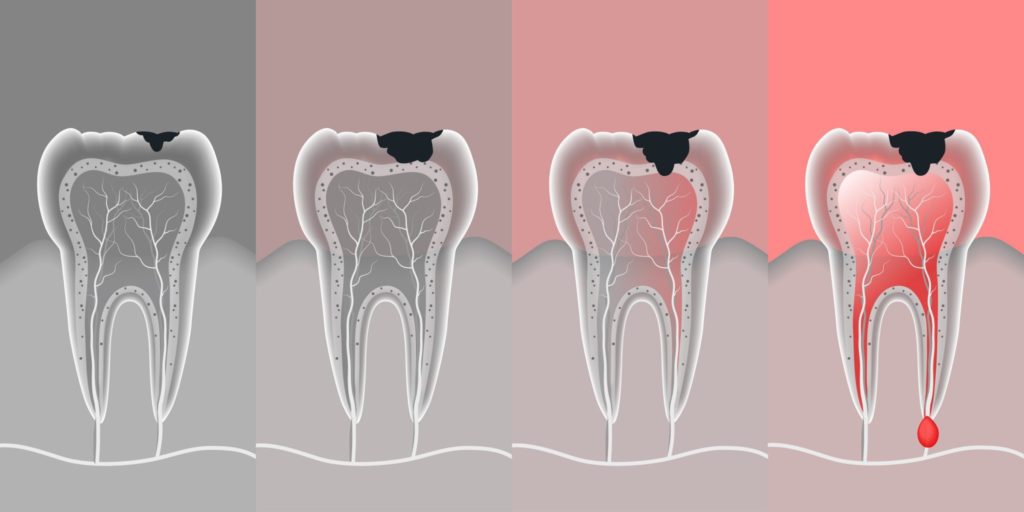Dental caries is one of the most common oral diseases in both children and adults. According to data from 2015, the prevalence of caries in adults over 35 years of age is between 95% and 100%.
Furthermore, according to the study Oral health in Spain 2020, the number of caries is not expected to decrease, but rather it will remain at the current figure, around 95% of those affected in the Spanish adult population.
Why is the problem so widespread? One possible explanation is that cavities are usually asymptomatic in the early stage, that is, they do not initially cause pain, inflammation or other noticeable symptoms, so the person is usually not aware that they have cavities. Therefore regular checkups are important, since the dentist does detect cavities at an early stage, when they are easier to treat, and can advise us how to prevent them.
What is the dental caries?
Caries is an oral disease of bacterial origin. In other words, it is a form of infection that damages the surface of the dental enamel, and makes holes in it until it reaches the innermost areas of the tooth.
In this graph we can see the main phases of dental caries:

Main symptoms of caries
The symptoms of cavities vary according to their size, the stage they are in and their location. For example, as we have discussed, in the initial phase there are usually no symptoms, can only become perceptible to the naked eye as a small black dot.
As it progresses, we can notice a sudden pain in the teeth or molars without apparent cause or when biting. Is a tooth sensitivity which is also common to appear with the cold and when eating sweets.
In the more advanced stages, the hole will become larger and more visible, depending on the area in which it is located, and can cause nerve involvement. If this is the case, the pain can be extremely intense and spontaneous, without the need for external stimuli to cause it. In this situation it is easy for dental phlegmon to occur.
Factors that influence dental caries
Caries is a multifactorial disease, that is, it is caused by a combination of several factors, As the bacteria present in the mouth, the consumption of certain foods or drinks rich in sugars or carbohydrates, and incomplete or insufficient oral hygiene.
In addition, other factors such as the pH of saliva, genetic predisposition or some medications that alter the quality and quantity of saliva in the mouth can also influence the more or less frequent appearance of caries.
Caries prevention and treatment
The treatment of caries will depend on how advanced it is:
- In an early stage, caries can be treated with a filling. The dentist removes the damaged part of the enamel and places a material that covers it in that space. If the cavity is small in an incipient state that only affects the enamel, the filling is not made. If the enamel of the damaged area is cared for with proper hygiene and an extra supply of fluoride is applied, this enamel is repaired through physiological remineralization.
- If the decay has advanced and has affected the dental pulp, it may be necessary to a root canal, that is, devitalize the nerve.
- If the infection has advanced and it is not possible to save the tooth, it should be extracted, and it may be considered to perform a dental implant.
For this reason, as we have mentioned, it is very important to review our oral health at least once a year, to detect these possible problems at an early stage.
But in addition, we can carry out some actions to prevent the appearance of cavities, especially if we have a tendency to suffer from it:
- At the Ahoa Clinic we apply a prevention plan in patients with a high risk of caries. The first step will be to make a correct diagnosis of the predisposing factors. To do this we perform an analysis of the quality and quantity of saliva and an analysis of the concentration of strains of bacteria that cause caries. In this way we establish the risk of suffering the disease, that is, caries.
- follow a correct oral hygiene routine, which includes brushing, mouthwash and dental floss, especially before going to sleep.
- Avoid consuming foods and drinks with a high sugar content or carbohydrates. Above all, so-called energy drinks, since in addition to the sugar content, their acidity causes accelerated wear of the enamel.
- brush our teeth every time we eat, even when we snack on anything between meals.
In addition, at Ahoa we provide personalized advice to each patient, such as the most suitable toothpaste or mouthwash, since each person has their own characteristics that must be taken into account.
Call us and ask for a thorough review of your teeth. We already know, as Don Quixote said to Sancho, that a mouth without teeth is like a mill without a stone, and a tooth should be valued much more highly than a diamond!
